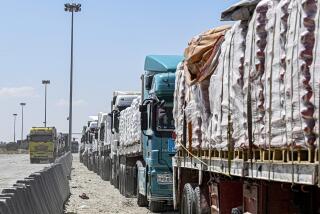Egypt’s Miseries
- Share via
By all signs Egypt is not a country destined to enjoy a quiet future. The widespread rioting by security units this week is indicative of the threat to stability that President Hosni Mubarak’s regime is likely to continue to confront. The immediate cause of the rampage is said to have been a rumor that conscripts in the miserably paid police forces would have their term of service extended. The more potent and enduring underlying cause is mounting frustration over the feeble and worsening state of Egypt’s economy.
Gross inefficiencies, widespread corruption, bureaucratic bumbling and dubious allocations of resources all contribute to a chronic economic malaise. Add to that a birthrate that is one of the highest in the world and that each year puts further strains on social services that have never, by any reasonable measurement, been regarded as adequate. Add to that the insoluble natural constraints of the Nile that limit agricultural production to only 3% of the land.
Add, finally, problems more recent in origin. Falling oil prices and a commensurate cut in production have slashed foreign-exchange earnings. Remittances from the significant part of the Egyptian labor force that is employed in the Arab oil-producing countries have declined. Scores of thousands of these often highly skilled workers have had to come home to a country where jobs are scarce, compensation is poor and living conditions are at best difficult. At the same time fears of terrorism have cut deeply into the revenues from tourism that have always been a major source of national income. This week’s attacks on hotels catering to Westerners seem certain to diminish the flow of tourists even more.
Meanwhile, Islamic fundamentalists, for decades a problem for successive regimes, see new chances to widen their appeal. Despising the West, the fundamentalists have grown more active in demanding the adoption of a strict Islamic legal code and the reshaping of society to rid it of the modern traits and influences that they consider to be the source of Egypt’s problems. Where frustrations are high, where squalor will not go away, the promise of fundamentalism tends to be listened to. Egypt’s present is unquestionably troubled. Its future is likely to be even more so.
More to Read
Sign up for Essential California
The most important California stories and recommendations in your inbox every morning.
You may occasionally receive promotional content from the Los Angeles Times.










